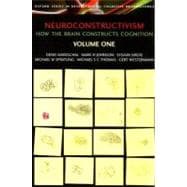
Neuroconstructivism - I How the Brain Constructs Cognition
by Mareschal, Denis; Johnson, Mark; Sirois, Sylvain; Spratling, Michael; Thomas, Michael; Westermann, Gert-

This Item Qualifies for Free Shipping!*
*Excludes marketplace orders.
Buy New
Rent Textbook
Rent Digital
Used Textbook
We're Sorry
Sold Out
How Marketplace Works:
- This item is offered by an independent seller and not shipped from our warehouse
- Item details like edition and cover design may differ from our description; see seller's comments before ordering.
- Sellers much confirm and ship within two business days; otherwise, the order will be cancelled and refunded.
- Marketplace purchases cannot be returned to eCampus.com. Contact the seller directly for inquiries; if no response within two days, contact customer service.
- Additional shipping costs apply to Marketplace purchases. Review shipping costs at checkout.
Summary
Author Biography
Denis Mareschal obtained his first degree from King's College Cambridge in Natural Science with a specialisation in physics and theoretical physics. He then went on to obtain a Masters in psychology from McGill University with a thesis on the computational modelling of cognitive development. Finally, he obtained a DPhil in Psychology from the University of Oxford for a thesis combining neural network modelling and the experimental testing of infant-object interactions. He took up an initial lecturing position at the University of Exeter (UK) in 1995 and moved to Birkbeck University of London in 1998 where he has been ever since. He was made professor in 2006. Sylvain Sirois' research is mainly concerned with the mechanisms of learning and development, which he studies through a combination of neurally-inspired neural network models, robotics, and empirical studies with babies, children, adults, and the elderly. Michael Spratling received a BEng. degree in Engineering Science from Loughborough University, and MSc and Ph.D. degrees in Artificial Intelligence and Neural Computation from the University of Edinburgh. He has held several research positions, both in psychology and in engineering, including a postdoctoral research fellowship in the Centre for Brain and Cognitive Development at Birkbeck College, University of London. He was appointed as a lecturer in the Division of Engineering at King's College London in 2004. Michael Thomas completed his D.Phil. in Experimental Psychology at University of Oxford in 1997. His principal research interests are in cognitive and language development, with a focus on developmental disorders. For more detail, see http://www.psyc.bbk.ac.uk/research/DNL/ Gert Westermann received his Diplom in Computer Science from the University of Braunschweig in Germany (he also spent a year at the University of Texas at Austin) and went on to do a PhD in Cognitive Science at the University of Edinburgh. Following this he worked as a researcher at the Sony Computer Science Laboratory in Paris and subsequently took up a Research Fellowship at Birkbeck College in London. He is now a Senior Lecturer in Psychology at Oxford Brookes University. During 2005-2006 he is on sabbatical in the Department of Experimental Psychology at the University of Oxford.
Table of Contents
| Preface | p. vii |
| Foundations | |
| Introduction | p. 3 |
| Encellment: the emerging function and morphology of neurons | p. 29 |
| Embrainment: the brain unboxed | p. 49 |
| Embodiment: representations in context | p. 69 |
| Principles, mechanisms and processes | p. 91 |
| Case studies | |
| The cortical basis of early visual perception...a story of multiple representations | p. 107 |
| Habituation in infancy...from interacting neural systems to active exploration | p. 117 |
| Phonological development...the integration of sensory motor representations | p. 129 |
| Infants and objects...from functional brain systems to behaviour | p. 139 |
| Ensocialment...minds and brains in society | p. 149 |
| Lesson from atypical development | p. 159 |
| Dyslexia: a case study of the application of the neuroconstructivist principles | p. 177 |
| Conclusions | |
| Conclusions and challenges for the future | p. 207 |
| References | p. 229 |
| Index | p. 271 |
| Table of Contents provided by Ingram. All Rights Reserved. |
An electronic version of this book is available through VitalSource.
This book is viewable on PC, Mac, iPhone, iPad, iPod Touch, and most smartphones.
By purchasing, you will be able to view this book online, as well as download it, for the chosen number of days.
Digital License
You are licensing a digital product for a set duration. Durations are set forth in the product description, with "Lifetime" typically meaning five (5) years of online access and permanent download to a supported device. All licenses are non-transferable.
More details can be found here.
A downloadable version of this book is available through the eCampus Reader or compatible Adobe readers.
Applications are available on iOS, Android, PC, Mac, and Windows Mobile platforms.
Please view the compatibility matrix prior to purchase.
